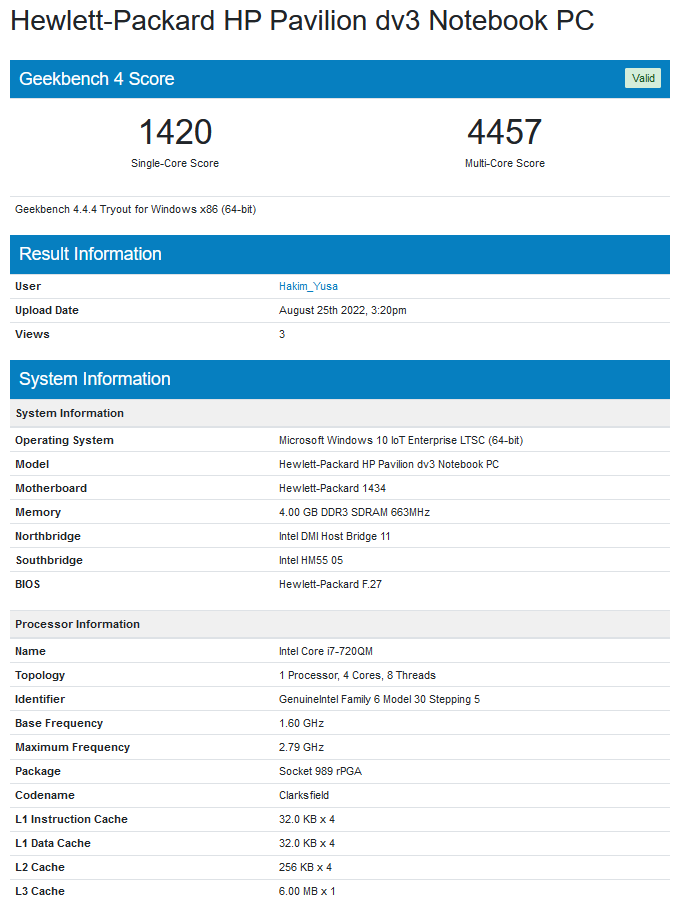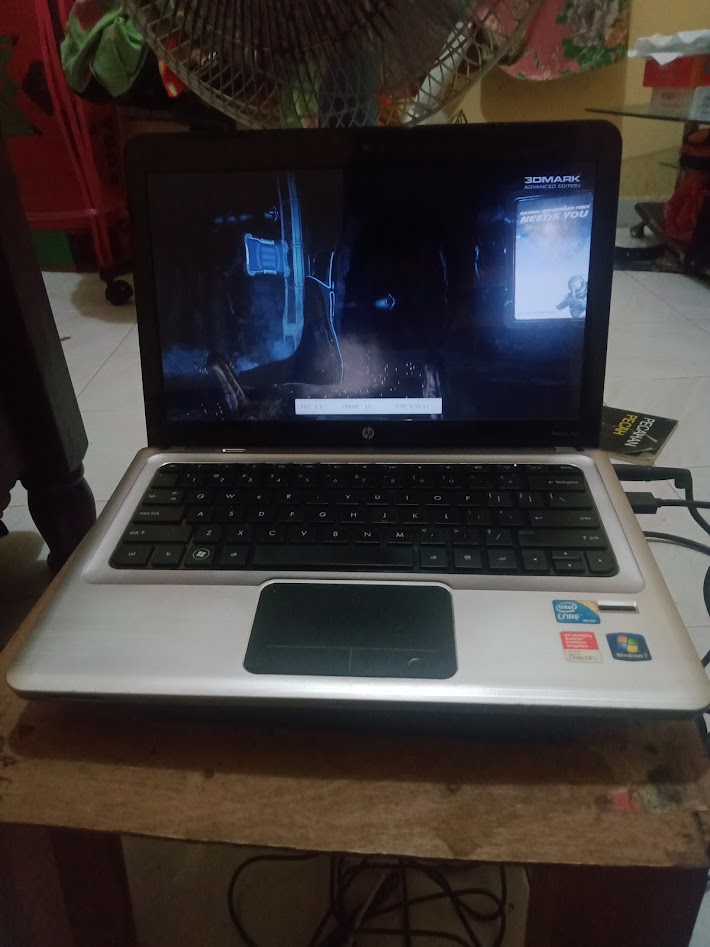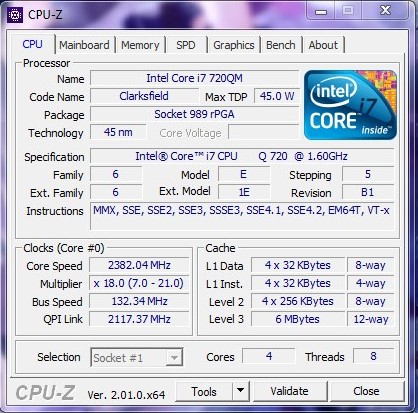Geekbench4 - Single Core score 1420 points with a i7-720QM
Thursday, 01 January 1970 07:00 | Update at null
Media Gallery
Screenshot

Device, Setup, etc



URL
https://hwbot.org/submission/5068117https://bit.ly/3cXdQD1
Information Detail
Hardware: Intel Core i7 720QM
Specs:CPUID : Intel(R) Core(TM) i7 CPU Q 720 @ 1.60GHz
Architecture : x86
Codename : Clarksfield
L3 Cache : 6MB
Clock : 1.60GHz - 2.80GHz
Core/Thread : 4/8
TDP : 45W
Technology : 45nm
Socket : PGA988
IGPU : -
See more specification...
Software: Geekbench4 - Single Core
Score: 1420 points
About: Geekbench4 - Single CoreGeekbench 4 – Single Core is one of the benchmark tests designed by Primate Labs to measure processor performance in a single-core CPU workload scenario. In the world of computing, single-core performance remains an important metric because many everyday applications, including games, browsers, and other lightweight applications, still heavily rely on the speed of a single core to efficiently execute instructions.
In this test, Geekbench 4 runs a series of workload simulations that mimic real-world tasks, such as encryption, data compression, image rendering, text processing, and physics simulation—all using only one core of the tested processor. The goal is to evaluate how quickly and efficiently the CPU completes tasks individually without the assistance of additional cores, so the results reflect the processor architecture's core capabilities.
The scores obtained from Geekbench 4 Single Core are crucial for comparing performance between processors, particularly in terms of architectural efficiency and operating frequency. CPUs with high single-core scores provide a more responsive experience in light use and light multitasking. This is an important indicator when selecting a processor for general needs such as browsing, working with documents, or running business applications.
One of Geekbench 4's key advantages is its ability to run on various operating systems, including Windows, macOS, Linux, Android, and iOS. This makes Geekbench one of the most flexible benchmarking tools for fairly comparing performance across platforms and devices.
Overall, Geekbench 4 – Single Core is a highly useful tool for anyone looking to accurately assess the single-core capabilities of a processor, especially in the context of daily use that doesn’t always involve all available cores.
The Intel Core i7-720QM, launched in Q3 2009, was one of the first mobile quad-core processors to feature Intel's Nehalem microarchitecture, specifically the Clarksfield variant. Targeted at high-performance laptops, such as gaming machines and mobile workstations, the i7-720QM brought 4 physical cores and 8 threads to the mobile platform, thanks to Hyper-Threading Technology providing a significant boost in multi-threaded workloads like video editing, 3D rendering, and other professional-grade applications. The processor runs at a base clock speed of 1.6 GHz, but it can dynamically increase up to 2.8 GHz using Intel Turbo Boost, depending on thermal headroom and power availability.
Manufactured using a 45nm process, the i7-720QM has a TDP of 45W, which is quite high by today's mobile CPU standards. This thermal demand necessitated more robust cooling solutions in laptops that featured the chip. Unlike modern CPUs, the i7-720QM does not come with integrated graphics, which means systems based on this processor require a dedicated GPU often from AMD or NVIDIA for graphics processing and display output. As such, it was typically paired with mid-to-high-end discrete graphics cards in its time, making it a solid choice for gaming and multimedia laptops in the late 2000s and early 2010s.
While the Core i7-720QM was a powerhouse during its release, its performance and efficiency are significantly outpaced by modern CPUs built on smaller nodes and with higher IPC (Instructions Per Clock). Nevertheless, legacy laptops using the i7-720QM can still be viable for basic computing tasks like web browsing, document editing, or watching videos especially if paired with an SSD upgrade and increased RAM. Users running Windows 10 on such systems may experience some limitations, but with proper optimization and lightweight software, the CPU can still deliver a usable experience in non-demanding environments.
Hardware Detail:
Device: HP Pavilion dv3-4054TX
RAM: 4GB DDR3 Single Channel
OS: Windows 7, Windows 10
* Not Avaiable
